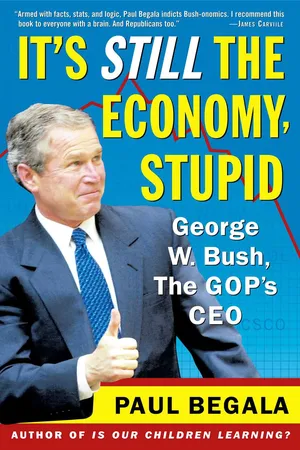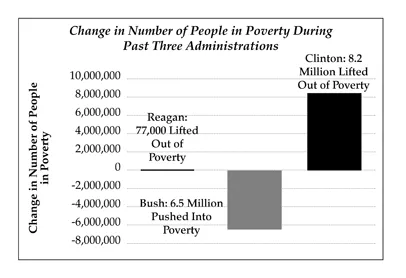![]()
ONE
The Clinton Economy: “The Best Economy Ever”
—Alan Greenspan, Chairman of the Federal Reserve (1/4/00).
“Mr. President … your commitment to fiscal discipline, which, as you know, and indeed have indicated, has been instrumental in achieving what in a few weeks … will be the longest economic expansion in the nation’s history.”
—Former Federal Reserve Chairman Paul Volcker, Audacity (Fall 1994).
“The deficit has come down, and I give the Clinton Administration and President Clinton himself a lot of credit for that. [He] did something about it, fast.”
—Business Week (5/19/97).
“Clinton’s 1993 budget cuts, which reduced red ink by more than $400 billion over five years, sparked a major drop in interest rates that helped boost investment in all the equipment and systems that brought forth the New Age economy of technological innovation and rising productivity.”
—Goldman, Sachs & Co. (March 1998).
“[This is] the best economy ever [because] on the policy side, trade, fiscal and monetary policies have been excellent, working in ways that have facilitated growth without inflation. The Clinton Administration has worked to liberalize trade and has used any revenue windfalls to reduce the federal budget deficit.”
—Rep. Newt Gingrich (R-GA) Republican press conference (8/5/93).
“I believe this will lead to a recession next year. This is the Democrat Machine’s recession, and each one of them will be held personally accountable.”
WHEN MY GRANDMA BEGALA TELLS MY KIDS STORIES ABOUT THE Great Depression—one in four working people unemployed, bread lines and soup lines stretching around the block, rich men jumping out of windows and poor men living on the streets—it is literally impossible for me to imagine just how bad things were. They were that bad.
I fear that when I’m in my eighties, telling my great-grandchildren about the Clinton economy, it may be impossible for them to imagine just how good times were. They were that good.
And, even though it’s only been two years, memories fade. The Republican blame machine has been working overtime, hammering away relentlessly at America’s accomplishments, hoping you’ll forget the winning ways and broad prosperity of the Clinton Era. They’d like to convince us that our nation was never that strong, never all that smart, never that successful.
And yet, we were. As Casey Stengel used to say, “You could look it up.”
So, let’s look it up.
Jobs
The heart of any economy is its ability to generate jobs. When President Clinton took office, nearly 10 million Americans were unemployed.1 And the private sector was sputtering to create jobs—in fact, during the previous Bush presidency, what little job growth we did see was driven in large part by the government sector. Under President Clinton, by contrast, the American economy generated 22.88 million new jobs.2 More jobs than had ever before been created under a single administration.3 More jobs than Presidents Reagan and Bush Senior together created in twelve years.4 And 91 percent of the Clinton jobs were in the private sector.5
Poverty
If generating jobs is the heart of an economy, reducing poverty is its soul. We’ve had periods of macroeconomic growth that had very little effect on poverty rates. That’s because all the benefits of the growth went to a few people at the top of the economic pyramid. Such was the case during the Reagan years. During Reagan’s entire presidency, only 77,000 Americans were lifted out of poverty.6 Not even enough to sell out Royal-Texas Memorial Stadium for a Texas Longhorn football game.7 A paltry 0.24 percent reduction in the poverty rate.8 Pathetic.
Under President Clinton’s economic policies, 8.2 million Americans were lifted out of poverty.9 Enough to populate all of New York City.10 President Clinton’s economic policies caused a 21 percent reduction in the poverty rate—the greatest reduction since Lyndon Johnson’s Great Society and the strong economy of the 1960s.11
(By the way, under George Herbert Hoover … err … Walker … Bush, the number of Americans suffering in poverty increased by 6.5 million.14)
The Poor Will Always Be with You (Especially When the Republicans Are in Power)
Jesus said “you always have the poor with you.”12 I fear some Republicans take that as an excuse to do nothing about the problem of persistent poverty. Think I’m overstating it when I say too many Republicans are too callous about the plight of the poverty stricken? Read this New York Times coverage of President George Herbert Walker Bush’s strategy to deal with poverty in 1990:
“After considering a variety of ambitious options, the Bush administration has decided against proposing any major new program or strategy to combat poverty at this time, administration officials said today. An interagency group, convened last year by a senior adviser to President Bush to rethink the nation’s anti-poverty efforts, came up with a dozen broad alternatives. But in meetings over the last two weeks, a higher-ranking group, the President’s Domestic Policy Council, decided that the options were too expensive or would stir too much political controversy. The council, a Cabinet-level advisory board, concluded that the administration should simply try to make current programs work better. A White House official summarized the upshot this way: ‘Keep playing with the same toys. But let’s paint them a little shinier’ …
“The White House acknowledged that a major new ‘investment in children’ would have a big payoff for American society in the long run, but it shelved the idea after concluding that it was ‘not likely to show an immediate reward.’ … Although administration officials could not agree on specific proposals to reduce poverty, they did agree on a theme to link existing programs. The message, as described in papers circulated among Cabinet members, is … ‘economic empowerment’ for American families.”13
Why the disparity? It’s the difference between a temporary boom for a few, and sustained prosperity for many—what John F. Kennedy called “a rising tide (that) lifts all boats.”
And lift all boats the Clinton economy did. Both the African American and Hispanic poverty rates fell to their lowest levels on record.15 The number of African-American children in poverty fell nearly 33 percent, to an all-time low.16
Child poverty was the most shameful and painful measure of our economic performance in our past. President Clinton attacked this persistent problem and made more progress than anyone thought possible. His policies reduced poverty among children by almost 30 percent—the biggest decline since the ’60s.17 President Clinton raised 4.2 million children out of poverty.18 President Reagan, on the other hand, championed policies that focused on the fortunate few. His administration lifted only 50,000 kids above the poverty line.19 We still have a long way to go before we can honestly say that no child has been left behind. Of course, if poor kids could eat speeches, Dubya would have fed the world by now. But his abandonment of President Clinton’s focus on child poverty will haunt us for years to come.
Lifting All Boats
Under President Clinton, the typical American family’s income increased by $7,418 after adjusting for inflation.20 This is more than twice the increase in income during the Reagan-Bush years.21 In fact, as Gene Sperling, the brilliant chairman of the National Economic Council under President Clinton has documented, “during the Reagan-Bush era, 60 percent of households had no gains in income—and the bottom 20 percent saw incomes decline 4 percent.”22
During the Reagan-Bush era, the richest 20 percent of families saw their incomes rise dramatically, while the poorest families fell further and further behind.23 By contrast, in the Clinton era, every income group, from the richest to the poorest, saw income gains of at least 15 percent, adjusted for inflation, and the poorest 20 percent of families experienced the largest income gains—24 percent in real terms.24
The income of the typical African-American family increased a remarkable $8,854, or 35 percent, after accounting for the effects of inflation.25 And the gains made by those with the most ground to cover were the most striking. Consider this: from 1981 to 1992, the poorest 40 percent of African-American families saw their incomes fall by an average of 10 percent; during the Clinton administration, those same African-American families saw their incomes rise by an amazing 51 percent.26
For Hispanic families, the difference between the 1980s and the 1990s was similar: between 1981 and 1992, the poorest 80 percent of Hispanic households saw their incomes drop by an average of 6.7 per-cent; during the Clinton administration, the poorest 80 percent of Hispanic families experienced an average income increase of 25 percent.27
So, never again wonder why Bill Clinton is so beloved by the poor, by African-Americans and by Hispanic-Americans. It’s because his policies helped them live the American Dream—a dream that had been nothing more than the stuff of pious, pompous lectures under the Republicans.
Taxes: Higher on the Idle Rich; Lower on the Working Poor
When it came to taxes, President Clinton’s ideas were not new. They were as old as the biblical invocation that “From everyone who has been given much, much will be required.”28
President Clinton’s 1993 economic recovery package included an increase in the top marginal rate from 31 percent to 39.6 percent, which applied only to income above $250,000 a year. It also called for an increase in the federal gas tax of less than a nickel, and subjected the Social Security benefits of high-income retirees (whose average wealth was in excess of $1 million) to taxation.
Even as he raised taxes—primarily on the very rich—Clinton cut taxes deeply for the working poor. He greatly expanded the Earned Income Tax Credit—a tax incentive that rewards low-income people for working. Ronald Reagan signed the first EITC bill into law. President Clinton expanded it to make 15 million low-wage working families eligible. Combined with an increase in the minimum wage (from $4.25 to $5.15 an hour), Bill Clinton did more to reward, encourage and sustain low-wage working men and women than any president in history.
This was followed by a middle-class tax cut, signed into law in 1997. That law created a $500 per child tax credit, which, when combined with the Earned Income Tax Credit, meant that most middle-class and lower-income Americans had received real and meaningful tax cuts from President Clinton—even as we eliminated the deficit.
The Deficit and the Debt
When Bill Clinton was elected president, the deficit was the highest in history—$290 billion per year.29 In fact, in January 1993, the Congressional Budget Office projected that, in the year 2000, the annual federal budget deficit would be $455 billion, and reach a staggering, crushing, astronomical, economy-choking $653 billion in 2003.30
These projections may have been good mathematics, but they didn’t take into account the political will that President Clinton, Vice President Gore, and the House and Senate Democrats summoned to address the fiscal crisis.
Bill Clinton promised, above all, hope. And he delivered it in abundance. Shortly after Clinton took office, the Financial Times wrote, “The market opened markedly higher as investors and dealers got their first chance to react to Sunday’s comments by Mr. Lloyd Bentsen, the new treasury secretary, which suggested the White House views cutting the deficit as a top priority.”31
And the Wall Street Journal, just days after the president announced his economic recovery package, reported, “The spectacular bond market rally accelerated yesterday, with long-term Treasury bond yields plunging to another record low as investors rushed to embrace President Clinton’s economic package.”
By taking on the budget deficit—which Ronald Reagan once dismissed as “big enough to take care of itself”—President Clinton restored faith in America’s fiscal policy. His policies freed up funds for private inves...



